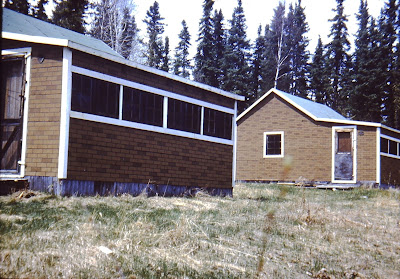 |
| Old Cabins 1 and 2 surrounded by long grass |
Chapter 14
Job No. 1 when my parents took over Bow Narrows Camp was to deal with the bugs. The black flies and mosquitoes in the yard were intolerable. It was impossible to sit outside without being devoured. So what to do?
The answer was to create those conditions that the insects avoid and eliminate the ones that they prefer. Small insects like black flies and mosquitoes fear drying out. They avoid bright, windy areas and hang back in the shade.
Bill Stupack would cut the grass around the cabins once or twice a summer with a scythe. That long grass was a bug heaven. So was the dark bush which surrounded the camp.
The Lawnboy lawn mower we had brought from Pickerel River was a godsend. It was exceedingly sturdy, suffering strikes against hidden rocks and stumps without bending the driveshaft. Dad was meticulous in cutting as close to the cabins and trees as possible, eliminating these small but important shade spots.
Next, he started clearing land. Eventually, after he had bought the property all the way down the lakeshore to Cabin 10, he opened up everything as much as possible, letting the west wind sweep down the peninsula from Trout Bay. The difference was like night and day. Having a shade tree here and there was fine, as long as we were able to cut the grass beneath it regularly. You didn't want enough trees to make a windbreak as that would become a bug breeding ground.
Before the clearing program, Dad and I went outside the old lodge -- now Cabin 3 -- one evening just before dark. We were still right at the door when Dad spotted a really big bear (another reason to keep things open -- you can see the bears). The immense bruin started right for us, its head low to the ground. It was the most blatant example of predatory behaviour I have ever seen.
"That boy's got to go, right now," said Dad. "Quick, get back into the house."
Mom and I closed all the windows, even though it was July and stifling hot.
Dad loaded his .308 and doused himself with Off, then stepped outside the door to wait for the bear. He was back inside in just minutes; the mosquitoes were so thick he couldn't breathe. They droned so loudly you couldn't hear anything else.
Dad got a can of molasses which he poured on the ground right in front of the window in the hallway where I slept. He slid the window open.
"You get up on your bed with the flashlight and when the bear comes to get this molasses, I'll give you the word. Shine the light over my shoulder, across the gun sights and onto the bear. I'll shoot right through the screen. It will just make a little hole that we can patch with a piece of tape."
Even with a big nasty bear at hand, Dad realized the importance of the screen against the bugs in the hot weather.
We probably saw the bear a dozen times, his long legs letting him stride quickly around all the cabins. He never stopped moving, probably because of the mosquitoes. It was dark now but there was a bit of moonlight.
There was no one else in camp but Dad, Mom and me, which was a blessing.
At long last, the bear came right to the molasses and Dad shot, never telling me to turn on the light. The bear was only four feet away, he said later. He couldn't miss.
The sound of the gun inside the little room was incredible. There were two guitars hanging on the wall behind me and they were ringing like the bells of Notre Dame Cathedral.
The bear ran and Dad opened the door and went after him. I was right behind with the flashlight.
We found the bear, dead, at the bush line. I could still hear the guitars ringing. Dad opened his mouth but couldn't make any sounds.
"What?" I tried to say, but I couldn't make any sounds either. I saw Dad mouth the word, "What?"
We were both totally deaf.
The mosquitoes were eating us alive so we hurried back inside. Dad grabbed a roll of electrical tape to patch the .30-caliber hole in the screen. To his chagrin he found that in addition to the little hole, the muzzle blast had blown three sides of the screen off the window. It was hanging like a flap. It wasn't until midnight that the guitars stopped ringing in my head.
The next day we went to look at the bear. It looked like a black polar bear -- very long body and neck and a small head. In the middle of the summer like this it's hide was worthless. There was nothing to do but throw the bear away.
We wished our guests could have shot it during hunting season but we had no other choice.
It was the most dangerous bear I have ever seen.

No comments:
Post a Comment